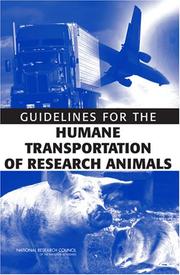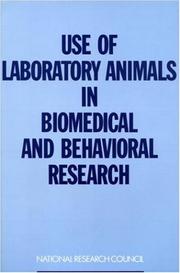| Listing 1 - 6 of 6 |
Sort by
|

ISBN: 0801871972 0801871964 Year: 2003 Publisher: Baltimore Johns Hopkins university press
Abstract | Keywords | Export | Availability | Bookmark
 Loading...
Loading...Choose an application
- Reference Manager
- EndNote
- RefWorks (Direct export to RefWorks)
Animal experimentation --- Human experimentation in medicine --- Vivisection --- History. --- Dierenwelzijn --- Dierproef --- Geschiedenis der geneeskunde --- Medische ethiek --- Medisch onderzoek --- Anti-vivisection --- Animal welfare --- Biology, Experimental --- Medicine, Experimental --- Experimentation on humans, Medical --- Medical experimentation on humans --- Medical ethics --- Medicine --- Clinical trials --- Experimentation on animals --- Zoopery --- Research --- Laboratory animals --- History --- Bien-être des animaux --- Expérimentation animale --- Histoire de la médecine --- Ethique médicale --- Recherche médicale
Book
ISBN: 1501770403 1501770411 Year: 2023 Publisher: Ithaca, New York : Cornell University Press,
Abstract | Keywords | Export | Availability | Bookmark
 Loading...
Loading...Choose an application
- Reference Manager
- EndNote
- RefWorks (Direct export to RefWorks)
"This book examines the implementation of the British Cruelty to Animals Act (1876) in its first three decades and analyzes how civil servants and scientists understood and co-constructed conceptions of animal pain"--
Animal welfare --- Animal welfare --- History --- Law and legislation --- Great Britain. --- cruelty to animal act, vivisection act, vivisection in the Victorian period, empathy and animal experimentation, anti-vivisection movement, Brow Dog Affair, history of vivisection, animal welfare law, history of bioethics, animal pain.

ISBN: 0309101107 9786610542505 1280542500 0309657180 9780309657181 9780309657242 0309657245 9780309101103 9781280542503 6610542503 030916477X Year: 2006 Publisher: Washington, DC : National Academies Press,
Abstract | Keywords | Export | Availability | Bookmark
 Loading...
Loading...Choose an application
- Reference Manager
- EndNote
- RefWorks (Direct export to RefWorks)
Electronic books. -- local. --- Laboratory animals -- Transportation. --- Vivisection. --- Social Control, Formal --- Government --- Risk Management --- Technology, Industry, and Agriculture --- Organization and Administration --- Animal Population Groups --- Social Sciences --- Biology --- Safety --- Organizations --- Biological Science Disciplines --- Sociology --- Animals --- Technology, Industry, Agriculture --- Health Care Economics and Organizations --- Accident Prevention --- Health Services Administration --- Anthropology, Education, Sociology and Social Phenomena --- Health Care --- Eukaryota --- Accidents --- Natural Science Disciplines --- Organisms --- Disciplines and Occupations --- Public Health --- Environment and Public Health --- Safety Management --- Animal Welfare --- State Government --- Federal Government --- Government Regulation --- Transportation --- Internationality --- Laboratory Animal Science --- Animals, Laboratory --- Agriculture --- Earth & Environmental Sciences --- Animal Sciences --- Laboratory animals --- Transportation. --- Anti-vivisection --- Animals, Experimental --- Animals in research --- Experimental animals --- Lab animals --- Animal experimentation --- Animal welfare --- Biology, Experimental --- Medicine, Experimental --- Animal culture --- Laboratory organisms --- Working animals

ISBN: 0309038391 9786610214938 1280214937 0309564220 0585144168 9780585144160 0309078784 9780309078788 9780309038393 Year: 1988 Publisher: Washington, D.C. : National Academy Press,
Abstract | Keywords | Export | Availability | Bookmark
 Loading...
Loading...Choose an application
- Reference Manager
- EndNote
- RefWorks (Direct export to RefWorks)
SCIENCE --- Experiments & Projects --- Animal experimentation --- Vivisection --- Laboratory animals --- Statistics as Topic --- Risk Assessment --- Animal Welfare --- Government --- History --- Risk --- Federal Government --- Research --- Social Control, Informal --- Animal Experimentation --- Animal Testing Alternatives --- Biomedical Research --- Research Personnel --- Public Policy --- Government Regulation --- Social Control, Formal --- Behavioral Research --- Animals, Laboratory --- Reference Standards --- Organizations --- Mathematics --- Animal Population Groups --- Occupational Groups --- Persons --- Probability --- Behavioral Sciences --- Epidemiologic Methods --- Weights and Measures --- Epidemiologic Measurements --- Health Care Economics and Organizations --- Sociology --- Animal Use Alternatives --- Science --- Investigative Techniques --- Social Control Policies --- Health Care Evaluation Mechanisms --- Social Sciences --- Humanities --- Risk Management --- Policy --- Public Health --- Named Groups --- Natural Science Disciplines --- Organization and Administration --- Anthropology, Education, Sociology and Social Phenomena --- Behavioral Disciplines and Activities --- Animals --- Mathematical Concepts --- Analytical, Diagnostic and Therapeutic Techniques and Equipment --- Health Care --- Quality of Health Care --- Disciplines and Occupations --- Environment and Public Health --- Psychiatry and Psychology --- Eukaryota --- Health Care Quality, Access, and Evaluation --- Health Services Administration --- Phenomena and Processes --- Organisms --- Zoology - General --- Zoology --- Health & Biological Sciences --- Animal experimentation. --- Vivisection. --- Laboratory animals. --- Animals, Experimental --- Animals in research --- Experimental animals --- Lab animals --- Anti-vivisection --- Experimentation on animals --- Zoopery --- Animal culture --- Laboratory organisms --- Working animals --- Animal welfare --- Biology, Experimental --- Medicine, Experimental
Book
ISBN: 1479801291 Year: 2020 Publisher: New York : New York University Press,
Abstract | Keywords | Export | Availability | Bookmark
 Loading...
Loading...Choose an application
- Reference Manager
- EndNote
- RefWorks (Direct export to RefWorks)
Uses literature to understand and remake our ethics regarding nonhuman animals, old human beings, disabled human beings, and cloned posthumansLiterary Bioethics argues for literature as an untapped and essential site for the exploration of bioethics. Novels, Maren Tova Linett argues, present vividly imagined worlds in which certain values hold sway, casting new light onto those values; and the more plausible and well rendered readers find these imagined worlds, the more thoroughly we can evaluate the justice of those values. In an innovative set of readings, Linett thinks through the ethics of animal experimentation in H.G. Wells's The Island of Doctor Moreau, explores the elimination of aging in Aldous Huxley's Brave New World, considers the valuation of disabled lives in Flannery O'Connor's The Violent Bear It Away, and questions the principles of humane farming through reading Kazuo Ishiguro's Never Let Me Go, where cloned human beings are used systematically by the government as organ donors. By analyzing novels published at widely spaced intervals over the span of a century, Linett offers snapshots of how we confront questions of value.In some cases the fictions are swayed by dominant devaluations of nonnormative or nonhuman lives, while in other cases they confirm the value of such lives by resisting instrumental views of their worth--views that influence, explicitly or implicitly, many contemporary bioethical discussions, especially about the value of disabled and nonhuman lives. Literary Bioethics grapples with the most fundamental questions of how we value different kinds of lives, and questions what those in power ought to be permitted to do with those lives as we gain unprecedented levels of technological prowess.
English fiction --- Bioethics in literature. --- People with disabilities in literature. --- Human body and technology in literature. --- American fiction --- Handicapped in literature --- Physically handicapped in literature --- History and criticism. --- Aging. --- Aldous Huxley. --- Alison Kafer. --- Animal ethics. --- Animal studies. --- Animal welfare. --- Brave New World. --- Cloning. --- Conceptions of the human. --- Curative imaginary. --- Deafness. --- Disability studies. --- Dsiability. --- Dystopia. --- Engineered human beings. --- Ethics of fiction. --- Eugenics. --- Flannery O’Connor. --- Genetic enhancement. --- H.G. Wells. --- Human exceptionalism. --- Humane farming. --- Intellectual disability. --- Kazuo Ishiguro. --- Liberal eugenics. --- Life narratives. --- Life stages. --- Martha Nussbaum. --- Moral worth. --- Never Let Me Go. --- Resistant reading practices. --- The Island of Doctor Moreau. --- The Violent Bear It Away. --- Thought experiments. --- Value of lives. --- Vivisection. --- LITERARY CRITICISM / General. --- Flannery O'Connor. --- Aging;Aldous Huxley;Alison Kafer;Animal ethics;Animal studies;Animal welfare;Brave New World. --- Hearing loss --- Audiology --- Ear --- Hearing disorders --- Hearing --- People with disabilities --- Sociology of disability --- Education --- Homiculture --- Race improvement --- Euthenics --- Heredity --- Involuntary sterilization --- Idiocy --- Intellectual disabilities --- Mental deficiency --- Mental retardation --- Developmental disabilities --- Psychology, Pathological --- People with mental disabilities --- Experiments, Thought --- Methodology --- Anti-vivisection --- Animal experimentation --- Animal welfare --- Biology, Experimental --- Medicine, Experimental --- Genetic engineering --- Reproduction, Asexual --- Diseases --- Study and teaching --- Curricula --- Bioethics in literature..
Book
ISBN: 0691198446 Year: 2019 Publisher: Princeton, NJ : Princeton University Press,
Abstract | Keywords | Export | Availability | Bookmark
 Loading...
Loading...Choose an application
- Reference Manager
- EndNote
- RefWorks (Direct export to RefWorks)
Late nineteenth-century England witnessed the emergence of a vociferous and well-organzied movement against the use of living animals in scientific research, a protest that threatened the existence of experimental medicine. Richard D. French views the Victorian antivivisection movement as a revealing case study in the attitude of modern society toward science.The author draws on popular pamphlets and newspaper accounts to recreate the structure, tactics, ideology, and personalities of the early antivivisection movement. He argues that at the heart of the antivivisection movement was public concern over the emergence of science and medicine as leading institutions of Victorian society--a concern, he suggests, that has its own contemporary counterparts.In addition to providing a social and cultural history of the Victorian antivivisection movement, the book sheds light on many related areas, including Victorian political and administrative history, the political sociology of scientific communities, social reform and voluntary associations, the psychoanalysis of human attitudes toward animals, and Victorian feminism.Richard D. French is a Science Advisor with the Science Council of Canada.Originally published in 1975.The Princeton Legacy Library uses the latest print-on-demand technology to again make available previously out-of-print books from the distinguished backlist of Princeton University Press. These editions preserve the original texts of these important books while presenting them in durable paperback and hardcover editions. The goal of the Princeton Legacy Library is to vastly increase access to the rich scholarly heritage found in the thousands of books published by Princeton University Press since its founding in 1905.
Vivisection. --- Medicine --- History. --- Abdominal surgery. --- Abolitionism. --- Anesthesia. --- Anesthetic. --- Animal rights. --- Anna Kingsford. --- Anthrax. --- Anthropomorphism. --- Anti-Corn Law League. --- Anti-intellectualism. --- Antiscience. --- Antiseptic. --- Antitoxin. --- Apothecary. --- Assistant medical officer. --- British Institution. --- British Medical Association. --- Charles Darwin. --- Charles Dickens. --- Chartism. --- Chemotherapy. --- Clinical research. --- Clinical trial. --- Complication (medicine). --- Contagious Diseases Acts. --- Cruelty to animals. --- DEPT (medicine). --- Death. --- Diphtheria. --- Disenchantment. --- Disinfectant. --- Dissection. --- Doctor–patient relationship. --- Epilepsy. --- Frances Power Cobbe. --- General Medical Council. --- Germ theory of disease. --- Homeopathy. --- Hospital Authority. --- Hospital. --- Immunization. --- Immunology. --- Inoculation. --- Iron law of oligarchy. --- James Blundell (physician). --- Joseph Lister. --- Medical education. --- Medical ethics. --- Medical history. --- Medical jurisprudence. --- Medical literature. --- Medical research. --- Medical school. --- Monomania. --- National Anti-Vivisection Society. --- Natural theology. --- New York Academy of Medicine. --- Obstetrics. --- Ophthalmology. --- Pasteur Institute. --- Pathology. --- Pharmaceutical drug. --- Pharmacology. --- Physician. --- Physiology. --- Processing (Chinese materia medica). --- Psychoanalysis. --- Psychohistory (fictional). --- Public health. --- Public morality. --- Relationship between religion and science. --- Royal College of Physicians. --- Royal College of Surgeons. --- Royal Commission. --- Royal Humane Society. --- Royal Society for the Prevention of Cruelty to Animals. --- Scientism. --- Smallpox. --- Stephen Paget. --- Surgery. --- Tetanus. --- The Illustrated London News. --- The Island of Doctor Moreau. --- The Physician. --- The Physiological Society. --- The Politician (book). --- Therapeutic nihilism. --- Thomas Henry Huxley. --- Torture chamber. --- Toxicology. --- Tuberculosis. --- Utilitarianism. --- Vaccination. --- Vaccine. --- Victorian era. --- War. --- Water fluoridation controversy. --- William Edward Forster. --- William Paley.
| Listing 1 - 6 of 6 |
Sort by
|

 Search
Search Feedback
Feedback About
About Help
Help News
News